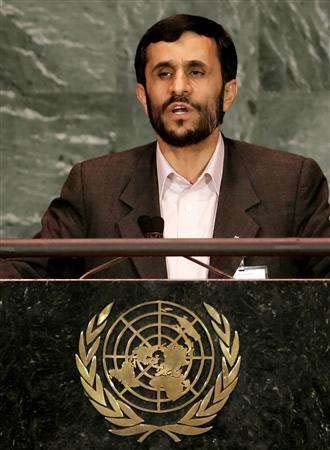 The United Nations General Assembly opened in New York Wednesday with eye-opening speeches from leaders of three of the world's most controversial nations. United States president Barack Obama set the meeting abuzz with his first speech to the UN.
The United Nations General Assembly opened in New York Wednesday with eye-opening speeches from leaders of three of the world's most controversial nations. United States president Barack Obama set the meeting abuzz with his first speech to the UN.
The governing body made of 192 nations is likely to be one of Obama's largest focuses in dealing with the numerous foreign policy challenges he and his administration face. He also faces a daunting task in regaining the trust of the body after it was largely undermined under recent US presidencies, including George W. Bush's administration, which sidestepped the UN and its advice when it invaded Iraq in March 2003.
Obama's standout talking point was when he pitched the Assembly on a different America under his presidency. "We have re-engaged the United Nations," he said, going on to lay out the importance of working together, as well as the policy changes he has already implemented nine months into his first year as president.
He also called out nations, though not by name, that he said have showed "reflexive anti-Americanism" in dealing with some of the more serious issues brought to the Assembly in recent years.
This proved to be a fitting starting point for two speakers who followed Obama: Libyan leader Muammar Gadhafi, who spoke directly after Obama, and Iranian president Mahmoud Ahmadinejad. Gadhafi (at left) made his first appearance at the annual meeting forty years into his reign as leader of Libya, but also as president of the African Union, which has been pressured recently to take control of several crises across the African continent.
Gadhafi (at left) made his first appearance at the annual meeting forty years into his reign as leader of Libya, but also as president of the African Union, which has been pressured recently to take control of several crises across the African continent.
He was allotted 15 minutes to speak, but went for 90 in a speech that urged the Security Council to adopt an African seat, but also strayed to hit on subjects ranging from the Taliban, to Iraq, an Israeli-Palestinian state, and the H1N1 virus. He also at one point said the Security Council should be renamed the "Terror Council" because of the power the veto nations have over the Council. He also tore up paper he represented as the UN Charter, which drew criticism from other leaders, including UK Prime Minister Gordon Brown.
Despite his wide-ranging criticisms of the western world's "agenda" and his displeasure with the UN bodies in general, he did offer a glimmer of approval for Obama when he said he wished the new president would have a lengthy presidency.
Possibly the most important speech of the day, however, was made by Iran president Mahmoud Ahmadinejad in his first major speech to the UN and first on US soil since his controversial election in June.
Ahmadinejad defended his presidency and called the election, rocked by massive protests after allegations of fraud, an homage to the people and "fully democratic." In classic Ahmadinejad fashion, he also delivered backhanded attacks on Israel and the United States, eventually prompting walkouts by several western diplomats, including a handful from the US and Canada.
massive protests after allegations of fraud, an homage to the people and "fully democratic." In classic Ahmadinejad fashion, he also delivered backhanded attacks on Israel and the United States, eventually prompting walkouts by several western diplomats, including a handful from the US and Canada.
The Security Council did break ground in dealing with one of its long-standing issues: dealing with Iran's nuclear ambitions. The five nations with veto power - China, Russia, Britain, France, and the United States, with Germany also signing on - issued a statement threatening further sanctions should Iran not cooperate in talks regarding its nuclear program, the two former being important because of their prior reluctance to take a major stance on Iran's nuclear ambitions because of trade agreements.
The nations set an October 1 meeting deadline by which Iran can decide whether or not to attend a meeting to begin negotiations regarding its nuclear program. UK Foreign Minister David Miliband read the statement, threatening harsh sanctions should Iran not comply. Ahmadinejad has acknowledged he will consider letting his nuclear scientists meet with western scientists to discuss the state's nuclear situation.
While the meeting's importance has diminished in recent years and been mostly a place for disgruntled leaders to voice their opinions or other leaders to push their agendas, Wednesday's meeting laid out many of the glaring problems facing the UN both internally and on the international scale.
It also sets quite the stage for Thursday and Friday's G20 Summit in Pittsburgh, where the organization will again meet to tackle the issues facing the global economy and financial institutions.
The two meetings are major steps in the Obama Administration's intent to improve foreign relations and to better coordinate on a global level with other nations to attack the global economic crisis as well as Afghanistan, Iraq, and other flash-point areas such as Somalia and Myanmar, where organized multi-national efforts are either under way or being discussed to stabilize the respective state governments.
23 September 2009
Fireworks at Opening of UN General Assembly
Labels:
ahmadenijad,
G20,
Gadhafi,
General Assembly,
Iran,
United Kingdom,
united nations,
United States
Subscribe to:
Posts (Atom)
